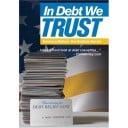
Princes of the Yen
"Central banks have the power to create economic, political and social change. This is how they do it." This passage opens the film, and that is precisely what non-partisan political and socio-economic documentarian group QueuePolitely puts under the microscope in the Princes of the Yen. Based on a book by Professor Richard Werner and directed by Michael Oswald, the film aims to break down and simplify the ways in which central banks influence the world we live in.
The film opens on archival footage from the 1941 Japanese bombing of Pearl Harbor, and works to set the stage for what would become an American-led occupation of post-war Japan where Democracy was imposed upon the nation "as if they'd never heard of it." The commercial banking system of the country was logically in shambles, with most of its assets being comprised of war bonds and loans to industries that had been wrecked by the war - rendering it basically bankrupt.
This shortcoming was alleviated by the Japanese central bank swooping in and buying these worthless assets with newly-created reserves. The first two post-war Japanese central bank governors were appointed by the American occupation hierarchy, and numerous other high-ranking government officials that would assume power in the war's aftermath were very much in line with the American agenda.
Through an economic principal called "window guidance," the Bank of Japan, after being awarded complete autonomy with its economic policies, would maintain strict control over who and what commercial banks were allowed to lend money to. As time went on and the Japanese economy continued the grow at unprecedented rates, these controls catered to the trend because it was of course easiest and most ideal to sustain the financial bubble.
By the 1980's, Japanese bankers had become notorious for pushing loans onto high-risk candidates at bargain interest rates, a practice encouraged by management because the banks themselves needed to hit the lending quotas imposed on them by the Bank of Japan. These risky financial decisions eventually led to a monumental economic crash in the early 90's, which is the inevitable outcome of reckless and greedy practices like these.
Directed by: Michael Oswald




Great documentary, though the creators should have also shown more or less exactly where the revenue of those illicit procedures went.
why are they wearing masks?
at first i thought this was bad doc then i watched it and now is 3rd time i watch this doc, all i can say is this financial technology is a scam which Thomas Jefferson tried to warn us more than 200 years ago. i will quote what he said:
“If the people ever allow private banks to control the issue of their currency, first by inflation, then by deflation, the banks…will deprive the people of all property until their children wake-up homeless on the continent their fathers conquered…. The issuing power should be taken from the banks and restored to the people, to whom it properly belongs.” – Thomas Jefferson in the debate over the Re-charter of the Bank Bill (1809)
crisis = sovereign destruction = global centralization = one world order
An informative doc with a nice admixture of found footage, ambient music, and Richard Werner as the thematic throughline.
good documentary.
I can't wait for a sequel :o)
I thought it very oversimplified and formalistic. It was interesting to get inside names and such from Japan though- that often neglected in the press economic dynamo.
I fail to see at all though how Japan ran a 'war economy' during peacetime. That is a demonizing criticism de facto that is a gross error. I think the term they wanted was 'command economy' but since recovery (early 50's roughly) Japan has never been that, though it has elements of it. So has every nation.
Very very good doc
Great work
Luis
Great documentary. Eerily familiar though.